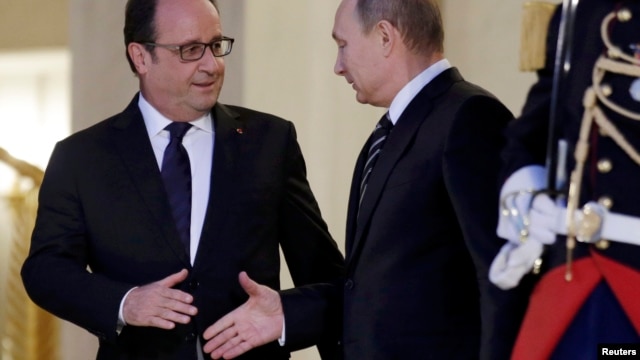Hollande: Elections in eastern Ukraine likely to be delayed
| Publisher | Radio Free Europe/Radio Liberty |
| Publication Date | 2 October 2015 |
| Cite as | Radio Free Europe/Radio Liberty, Hollande: Elections in eastern Ukraine likely to be delayed, 2 October 2015, available at: https://www.refworld.org/docid/56813c1015.html [accessed 4 June 2023] |
| Disclaimer | This is not a UNHCR publication. UNHCR is not responsible for, nor does it necessarily endorse, its content. Any views expressed are solely those of the author or publisher and do not necessarily reflect those of UNHCR, the United Nations or its Member States. |
October 02, 2015
By RFE/RL
 French President Francois Hollande (left) shakes hands with Russian President Vladimir Putin after a summit on the Ukraine crisis at the Elysee Palace in Paris on October 2.
French President Francois Hollande (left) shakes hands with Russian President Vladimir Putin after a summit on the Ukraine crisis at the Elysee Palace in Paris on October 2.
French President Francois Hollande says local elections slated to be held in rebel-held areas of eastern Ukraine this month will likely be postponed until 2016 amid Kyiv's standoff with the Russian-backed separatists.
The rebels are planning separate elections in territory under their control, which Western governments say would violate the terms of a February peace agreement that was signed in Minsk.
Hollande made the remarks in Paris on October 2 following talks with Ukrainian President Petro Poroshenko, Russian President Vladimir Putin, and German Chancellor Angela Merkel.
"On the election issue ... it will take longer. We don't want elections to get held in eastern Ukrainian territories under conditions that would not respect Minsk," Hollande said.
Hollande and Merkel said the leaders agreed that a new electoral law would be passed in Ukraine.
Hollande said that "it's therefore likely, even certain now, that – since we need three months to organize elections – we would go beyond the date that was set for the end of the Minsk [process], that is to say [beyond] December 31, 2015."
The Minsk deal includes a year-end deadline for Kyiv to recover full control over its border with Russia.
Merkel, who described a "positive mood" at the Paris meeting, said after the talks that Putin had "committed to working towards ... establishing the conditions that would allow elections to take place according to Minsk, based on Ukrainian law, in a coordinated fashion between the separatists in Donetsk and Luhansk and the Ukrainian government."
The Paris talks were aimed at solidifying the fragile peace agreement in eastern Ukraine, where fighting between Kyiv's forces and the separatists has nearly stopped along the front line since a renewed cease-fire was initiated on September 1.
The reduction of hostilities in a conflict that has killed more than 7,900 people and displaced hundreds of thousands during the last 17 months has raised hopes of moving beyond the cease-fire to other issues signed in the Minsk peace deal, including the upcoming elections.
Defiant Separatists
But the separatists' representatives in Donetsk and Luhansk have previously announced they would conduct elections on their own terms on October 18 and November 1, respectively, without the involvement of the Ukrainian government.
That would be at odds with the terms of the February Minsk agreement.
The regular regional elections in the rest of the country are scheduled for October 25.
Despite the optimistic remarks by Hollande and Merkel on October 2, separatists leaders in eastern Ukraine said shortly after the Paris talks ended that they would not delay their planned vote.
Poroshenko has previously said that separate elections conducted by the rebels in eastern Ukraine would be a "red line" that Kyiv could not accept.
Kyiv has called for the voting in separatist-held territory to be canceled and wants the Kremlin to exert pressure on the rebel leaders to conduct the elections under Ukrainian jurisdiction.
After the Paris talks on October 2, Poroshenko expressed "cautious optimism."
Both Poroshenko and Hollande said a withdrawal of light weapons from the front line of the conflict in eastern Ukraine would begin on October 3.
Ukraine and the separatists earlier in the week agreed to withdraw light weapons from a buffer zone between their forces.
Ukrainian officials and mediators from the Organization for Security and Cooperation in Europe (OSCE) are also pushing for international observers to be granted access to rebel-controlled zones.
Kremlin spokesman Dmitry Peskov said after the meeting that the leaders had reaffirmed their position that there is "no alternative" to the implementation of the Minsk agreement, which Kyiv and the West have repeatedly accused Moscow and the separatists of violating.
Putin said on the eve of the Paris talks that the two sides in Ukraine were "far from a resolution, but there are elements that boost our confidence that the crisis can be overcome and the most important point is that there is currently no shooting."
The European Union will evaluate progress made on the Minsk accords by the end of the year before deciding whether to extend sanctions against Russia.
With reporting by AFP, dpa, and Reuters
Link to original story on RFE/RL website
